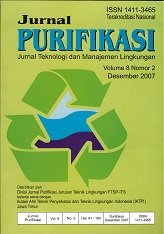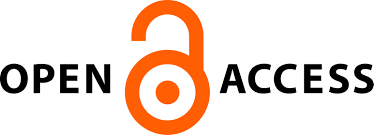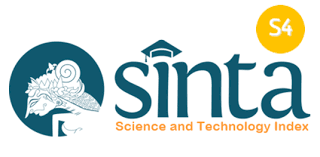EKO-BRIKET DARI SAMPAH PLASTIK CAMPURAN DAN LIGNOSELULOSA
Main Article Content
Abstract
The importance of energy alternative invention has been currently discussed nation wide because of the limiting fossil fuel resources. Municipal solid waste (MSW), on the other hand, has become an unsolved problem to date. The MSW of Surabaya City comprises 72,4% (1560 tons/day) lignocellulosic organic waste and 10,9% plastic waste (265,52 tons/day). The objectives of this research were to measure composition and characteristics of ecobriquette from mixed plastic and lignocellulosic waste. The variables used in this research were different plastic types, namely High Density Polyethylene (HDPE), Low Density Polyethylene (LDPE), Polypropylene (PP), Polystyrene (PS) and mixed plastics; lignocellulosic waste (namely wood, rice husk, and coconut shell); and different sizes (40 and 60 mesh) of lignocellulosic particles. The measured quality parameters were moisture content, volatile solids, fixed carbon, ash content, bulk density, calorific value, and flash point. These parameters were measured at different laboratories at Departments of Environmental Engineering, Mechanical Engineering, Civil Engineering, and Physical Engineering. Results of this research showed that the ecobriquette preparation from plastic and lignoselulosic wastes was successfully done using polyvinyl acetate (PVAc) glue. The selected best ecobriquette quality was composed of 20% mixed plastics and 80% coconut shell of 40 mesh (M20T40). The briquette characteristics were as follows: moisture content 12,79%, volatile solids 85,14%, fixed carbon 1,56%, ash content 0,64%, calorific value 8801,04 Cal/gram, bulk density 0,13 g/cm3, and flash point 131,8 oC. The ecobriquette quality met the quality standards of the Ministry of Energy and Mineral Resources Decree Number 47/2006. Therefore, it ecobriquette is one of potential fuel alternatives for coping with Indonesian energy limitation.
Downloads
Article Details
Submission of a manuscript to Jurnal Purifikasi means that the work has never been published in another journal and is not under consideration for publication elsewhere. The author hereby agrees to submit the copyright of the manuscript and its contents to Jurnal Purifikasi, if accepted for publication. Accepted manuscripts will be published in printed form where the ISSN is bound in printed form, not in online form (pdf). Authors are not allowed to publish their work in other forms (journals) without permission from the Jurnal Purifikasi manager.
By submitting a manuscript, the author is deemed to know all the rights and obligations attached to each manuscript.








